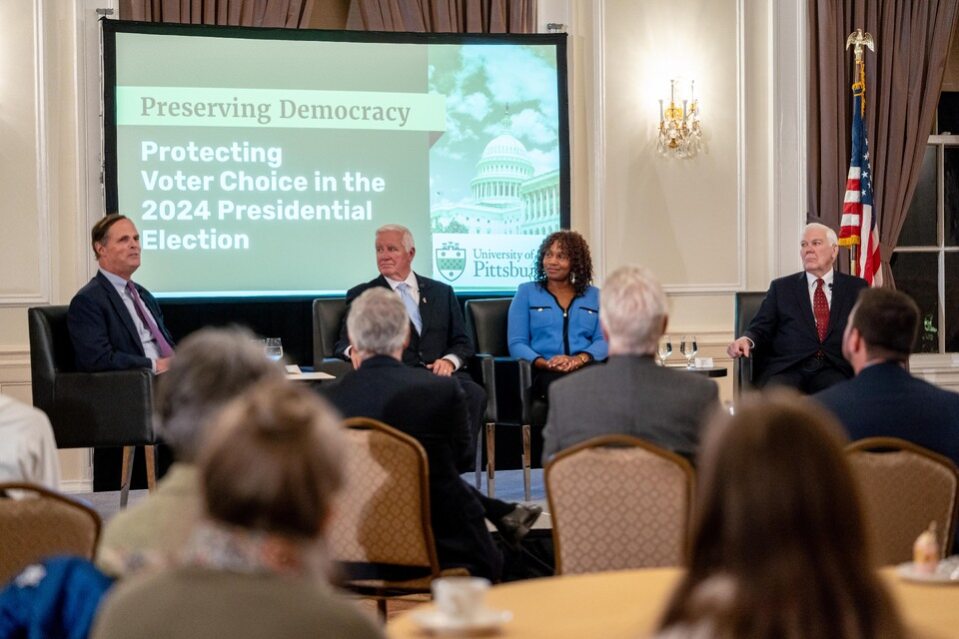Amanda Green-Hawkins said the images from the Jan. 6 riot at the Capitol in 2021 “keep [her] up at night.”
“I think that we’ve taken our democracy for granted,” Green-Hawkins, a voter-protection attorney and former Allegheny County Council member, said, “that this is a machine that will just work and ‘I don’t have to do anything about it.’ We have a lot of work to do to keep it going.”
Pitt’s Dick Thornburgh Program for Law and Public Policy partnered with the civic education organization Keep Our Republic to host an event titled “Protecting Voter Choice in the 2024 Presidential Election” Wednesday night. The event featured a panel discussion and audience Q&A and was the latest in a series of lectures at Pitt on Preserving Democracy.
The panel featured Pennsylvania’s 46th governor, Tom Corbett, former U.S. district judge Robert Cindrich and Green-Hawkins.
David Thornburgh, a senior adviser to the Committee of Seventy, chair of Ballot PA and moderator of the panel, said the program’s goal of bringing awareness to recent threats to American democracy begins with “bringing these distinguished [leaders] together to help understand the nature of the threats and the challenges that we have around the election.”
The discussion centered on the spread of misinformation and disinformation over social media that affected the 2020 election. Green-Hawkins emphasized the importance of building trust between U.S. citizens and electors when it comes to news and information.
“The more trusted sources you can have for people, I think the more likely you are to be able to combat a lot of disinformation and misinformation that they’re getting from all these data sources,” Green-Hawkins said.
When the discussion turned to the events of Jan. 6, 2021, Cindrich also highlighted the role that trust plays in the functioning of America’s democratic and legal systems.
“The law only works here to people who believe in the validity of the law,” Cindrich said.
Thornburgh asked what advice the panelists had for conducting civil discourse with friends and family members, especially with the Thanksgiving holiday approaching. Corbett said it’s important to find “common ground.”
“I implore you, do the best you can to talk to your neighbors,” Corbett said.
Green-Hawkins emphasized the importance of conducting these conversations with respect.
“We can disagree, but we at least recognize each other’s humanity and can treat each other with dignity and respect. And in many instances, that is missing,” Green-Hawkins said.
First-year political science and history double major Arthur Mikhlin said he agreed with this idea of finding a way to communicate with people who do not share the same political opinions.
“My American extended family is mostly Democrats. I’m more on the conservative side, [and] I have more of a different outlook since I grew up in Russia,” Mikhlin said. “It’s key to reach our differences, and we can always agree to disagree.”
Thornburgh said he hopes the audience leaves the event with a sense of their own responsibility for upholding democracy.
“Whether it’s to serve on an election board, to volunteer at the polls, to lead a discussion in your student group [or] to seek out folks that might know a little bit more than you do about how [democracy] works,” Thornburgh said. “Each one of us has a role to play.”



